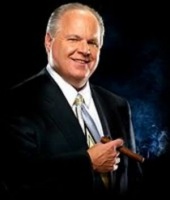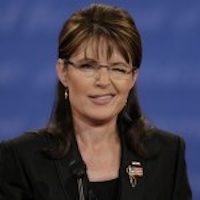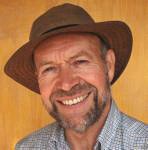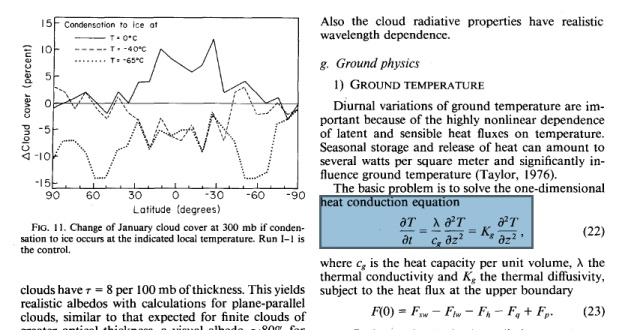

One Hundred and Ninety years ago, French mathematician and physicist Joseph Fourier published an article noting that given the Earth - Sun distance and the solar irradiance, the Earth should be cooler than it actually is. He suggested that the Earth's atmosphere acted to insulate the surface. In other words, Fourier first proposed the greenhouse effect. Joseph is also known for his heat conduction equation -- a parabolic partial differential equation and the use of Fourier series to solve the equation. You will no doubt recall being introduced to the subject in your fifth semester calculus course.
 Joseph Fourier |


|
About ninety seven years ago Alexander Graham Bell wrote that the continued use of fossil fuel might cause a greenhouse effect here on Earth. It's now known that carbon dioxide has risen from 270 parts per million in Fourier's time to 400 parts per million as of last spring. We also know that CO2, water vapor, and methane all absorb and re-emit infrared radiation in random directions that would otherwise escape into space. We've observed an increase in the global mean temperature of 1.3° F. Arctic sea ice has been declining dramatically and may disappear by the summer by 2030. Glaciers have been retreating worldwide. The sea level has been rising. The arctic permafrost line has been migrating northward. The altitude of the tropopause has been increasing. The pH of the oceans has been dropping (acidification). The average moisture level of the atmosphere has increased. There has been a dramatic increase in the frequency of extreme weather events.
The United Nations Intergovernmental Panel on Climate Change projects that global warming will have a significant impact on global food and water supply, habitat, cause extreme weather events, and cause major disruptions in our global ecosystem during the remainder of the century. Their projections for the end of the century are for between 2° F of warming which pretty is bad, and 9° F of warming which approaches seven horsemen, biblical plagues sort of bad.
There are some who would have you believe there is significant controversy about the whole idea of climate change. But there is
actually no controversy among scientists who publish peer reviewed articles in scholarly journals. We are free
to examine the published literature and make our own determination:
Yep. It's the heat conduction equation. Most of the general public is four years of math and physics away from being able to evaluate this paper. (The conclusions and abstracts are usually somewhat accessible). Thus we must rely on experts to help us formulate an opinion. The folks who write these papers are definitely intellectuals. You can get a general sense of how they are regarded by their peers by looking at how many citations their works have: Climate Experts at Google Scholars. A citation often means that a scholar trusted another scientist's work enough to base their own work (and reputation) on it.
| Climate Experts? | ||
|---|---|---|
| Could you discuss the use of Fourier series in the numerical modeling of the
heat transfer for climate simulations? |
||
 |
 |
|
| 4 A Series? I don't pay any attention to minor league baseball. | I know all about this. I did some modeling after high school. | |
| Some Real Climate Experts | |||||||
|---|---|---|---|---|---|---|---|
 |
 |
 |
 |
 |
 |
 |
 |
| Wallace S. Broeker | Christopher B. Field | James E. Hansen | Colin Prentice | TML Wigley | Spyros Pandis | Edouard Bard | David Rind |
The climate change denial people generally present data or arguments that omit most of the facts. This is known as cherry picking. Weather graphs that show cooling will invariably start at about 1998 -- an extreme El Nino year. If you choose your facts carefully enough you can come to rather outrageous conclusions. For example:
- The sun is at the same angle and the lengths of day are identical on the first day of spring and the first day of fall.
- So the Earth receives the same amount of radiation from the sun each day.
- The average temperature in Des Moines is 42° on March 21
- and it is 62° on September on 21.
- Why the difference? Well, the sun is closer by 680,000 miles on March 21st than September 21st.
- Obviously, the sun must be cold!
The following science associations and organizations are among those that have issued statements concurring with the IPCC Report:
|
|
|
